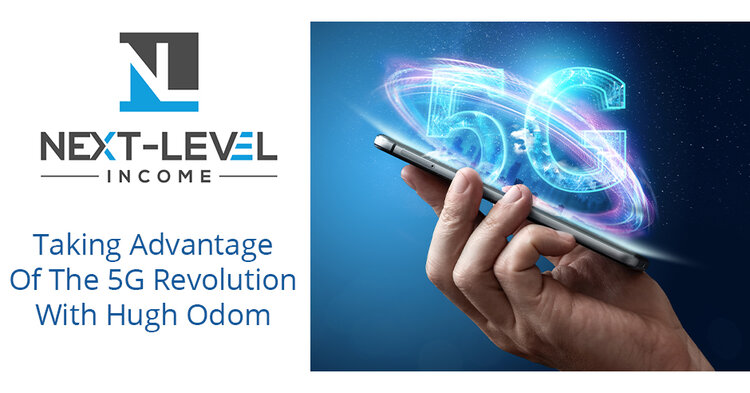Subscribe to The Next-Level Income Show
Technology Is Constantly Evolving, And It Does So At Such A Rapid Pace.
This sets the stage for the inevitable shift to 5G technology, paving the way to a new digital age yet again. Chris Larsen talks with Hugh Odom of Vertical Consultants to discuss the impact of this digital innovation on both small and large scales. He explains 5G’s role from improving the internet speed in your house to the significant shift it will cause in the realm of real estate.
Hugh delves into what adjustments are needed for 5G technology to optimally work, particularly in infrastructure. He even highlights the role of the COVID-19 pandemic in pushing us deeper into the virtual world, making our daily lives more and more dependent on 5G-powered equipment.
Watch The Episode Here:
Listen To The Podcast Here:
Taking Advantage Of The 5G Revolution With Hugh Odom
On the show, we have Hugh Odom, Founder and President of Vertical Consultants. Hugh was a former AT&T attorney and now consults for the likes of Walmart, McDonald’s, Disney, the US Postal Service and even cities like Atlanta and Charlotte, where we own multifamily properties. Hugh is going to be talking about the rollout of the 5G network and how it’s one of the most exciting opportunities of this decade.
—
Hugh, welcome to the show.
I appreciate it. I’m glad to be here.
I’m excited to have you on the show. We were chatting before and talking about how I can look up the mountain I live on. I see these 5G towers sitting up there, which is awesome for cell reception. It’s something I have had a real interest in. I have seen the full cycle of telecom here change over my few decades on the planet. For our audience that may not know about you or this technology, if you don’t mind, give the audience more information about your background, history and how you ended up getting here.
I’m the President and Founder of Vertical Consultants. My background is being a real estate and telecom attorney. I was an attorney inside AT&T for almost eleven years. I’ve worked with them throughout the Western United States in negotiating and structuring telecom deals for the owners on the other side of the table for that period of time. In 2010, we founded Vertical Consultants. What we did is we’ve swapped the sides of the table. We started working on behalf of property owners, everybody from individuals, small towns, small businesses, all the way up to providing counsel for Walmart, Disney, and McDonald’s. When they are either approached to put you on a property in the way of a cell tower, lease or something on top of the rooftop or they have an existing agreement with AT&T, and they are trying to renegotiate those restructures to not only get more money out of those deals but to protect their property, which is the most valuable asset.
A lot of people don’t realize that with your property rights, they go up to a point but they only go up so high and it changes based upon where they are. We got back from Puerto Rico. Down there, you see 5G cell towers on a building that are two stories high. It’s wild how they are doing that. Before we dive deeper into the 5G technology, talk about in a nutshell, how the telecom industry has changed.
We have gone from a situation where the wireless industry was about providing phone service and people would say, “I lost service. I don’t have a signal. I’m out of range.” There weren’t enough cell towers. They were building cell towers to provide service. That got done probably back in the late 2000s, where there were enough cell towers to provide service. People who use their cell phones understand besides air, water and food, you rely upon that thing most of anything for communication. We have right exactly.
What’s going on is we have gone from a situation where you had a cell phone to now you have a small computer. That is a data device. That is a supercomputer. The emphasis now isn’t to build out to provide coverage, it’s to provide data capacity because we’ve gone where we want more and more data, accessibility and the ability to use those phones. We do everything from playing games, texting, picture, watching movies, Telehealth, education and other things.
The evolution has been from phone service to a data service, to now an essential service, which is a utility. You have to have it to keep up on a lot of different levels. That was the progression that we have. The big thing we work on our behalf is all that stuff on your phone, all those apps, the things you can do from controlling your home to your car to everything you might imagine unless the infrastructure and backbone are there. Those are the cell towers and cell sites all across the United States. That was what we work to help people negotiating those deals on the side of leasing their landing. People using our land to provide that backbone for those services.
I want to get into that. One last thing before that. You had 3G, 4G, LTE and then you have 5G. What is the difference in power or transmission?
It’s a lot of things but two basic things. It’s capacity, the amount of data and latency. Latency is very simple. If I push a button, it takes a second for it to rack versus 5G. If I push a button, it takes 1/100th of a second for that thing to happen. The difference in the generations are all these different things but they come down to data capacity and also latency. That’s why you see people talking about self-driving cars and all this technology because your latency is going down tremendously, but also that capacity to pump all that data out has also increased.
To my knowledge, we wouldn’t be able to have the self-driving cars and everything that’s coming through without 5G, increasing the capacity and speed with all this is happening.
It’s a lot of things there. All of this is available in all of the technology that’s coming up. 6G is being tested already. We are talking about another level in another year or so. It provides you all the things that you are available to do, the connection points and the ability. That is what we are going into a digital economy world. We fixate on hardscape things, roads, bridges and all the things, which are important but we are going to be in a digital world. There’s no turning back from it. We are too far down that road.
I would love to go on and on in history and technology because I’m a nerd there being an engineer. Let’s talk more about real estate, what you do, what your company does and what the opportunity is out there. You mentioned working with companies like Walmart, McDonald’s and Disney. From what I recalled from your website, even like the United States Postal Service, Charlotte and Atlanta. These are household names. I’m a property owner. I’m in a city or municipality. I called you. Help the audience understand what your company does for real estate owners and companies.
We are usually contacted by two types of situations. All of the entities from individuals all the way up to the large companies. It’s either they’ve got contacted and saying, “I’m AT&T, Verizon or whoever. I want to put something on your property. I want to put a cell tower out there. I want to put something on your rooftop.” That is situation one. The second thing is they have an existing cell site agreement and they are looking or saying, “I don’t think I’m getting fair value for this. I need to restructure this.” We are able to go back, listen to things and understand what the true value of the use of the utility is being generated from those leases or sites. It comes to your leasing space but it’s your leasing utility. You need to structure these like a utility agreement.

5G Technology: People who use their cell phones understand that besides air, water, and food, you rely upon it most of anything for communication.
To give an example. Our immediate increase in revenue for our clients with existing agreements has been over 300% because of the undervalued nature of these agreements. It’s understanding that not only on the frontend when somebody has come out to you for a new agreement, how to structure that correctly and get full value now and going forward but also if you have an existing agreement, people from individuals to towns, cities and all the way to large corporations.
The thing about the industry is there are a lot of smart people out there on the property owner side. The problem is they are playing the wrong game and they are expecting to win. They are never going to win because they don’t have the information and the background. The other side of the game for the carriers and the cell tower companies spend tens of millions of dollars every year, if not more to get things set up in a way that benefits them and not the property owners.
That’s how it works. You have the big companies. They have all the information. They have the attorneys in-house and then you have come outside. Who is better to talk to than somebody who’s played the game on the inside and now comes on the outside? One of the big questions that is in my head and you say that is, do we need more space? Do we need more real estate? Do we need more locations for 5G? What’s driving some of these opportunities and actions?
It’s twofold. There are about 500,000 existing cell sites out.
Are those in the US?
It’s in the US. The majority of those needed to be upgraded for 5G equipment. That’s the first thing. That provides the opportunity to people who have existing cell site agreements to renegotiate based upon that upgrade into 5G to provide some opportunity and pair it with a value if the site goes up. The second thing is, for 5G, you need one of the elements of 5G buildout, which is densification. That means you have to have more cell sites. You have to densify the network. The only way you do that is to build more cell sites. It’s projected somewhere over the next 3 to 5 years, somewhere between 700,000 to 1 million new cell sites need to be built.
You are talking about doubling and tripling.
You have to. That is the only way the network works because you have to densify. You have to put cell sites out there a lot closer together because the range for 5G is a lot narrower with regards to the transmission of that signal. They have to almost be on top of each other. You are going to see initially a lot of buildout in urban areas because it’s the quickest method to get a return on investment for the wireless carriers, and then you are going to see out to the suburbs and the rural areas. You are going to see an opportunity for property owners, first of all, from the municipal level because that is the easiest way to do it. Build an existing right of ways or existing areas. You are going to see it trickle down to the private sector with regards to businesses and also down to individuals who own land as well.
We have a lot of investors who read the blog. They own real estate, Hugh. Some are direct owners and a lot are business owners as well. What are some types of properties out there? Let’s skip the municipalities. For private individuals, what are some optimal sites that you would look out for that we may say, “I have a site that I should discuss with you and see if it’s viable?”
I tell nobody to go out and buy a property or you need a cell site on it. The odds are too long to do that. If you have an existing site, there are two ways to go about getting something on your property. It is a stretch. Even with the buildout of another million sites, there are a lot of properties out there. First, if a site is needed for the buildout, the carrier will come to you and say, “We have a need.”
The second is we provide a referral service to put property owners in contact with buildout to companies for towers and rooftop sites. Get your property on that list. If there is a need in that area and they are building out in the next 12 to 36 months, they have a connection point with the property owner who is open to it. That narrows the odds a little bit. I wouldn’t tell anybody to buy a property for that but it’s a great way to generate ancillary or additional revenue. It’s based on a small amount of space and is usually not being used for other purposes.
Can you give us an example of that?
You can put some even on rooftop sites. If you are a commercial property on your own, let’s say an apartment building, office building or shopping center, what I’ll do is, first of all, rooftop space. If you have something over three stories tall, you are going to be available to possibly put something on your rooftop. You are talking about square-footage-wise somewhere between 80 to maybe 150 square feet total or sometimes less. If it’s a commercial property cell tower or a 5G tower, it’s looking between 500 to 1,000 square feet of raw land. It can go in the back of the property. They run the lease down to the boundary lines to the street.
You’ve got my wheels turning here. We’ve got a lot of commercial office buildings in the portfolio here across the United States. It makes me think about some stuff like that. One of the things is I did a little research here before. You mentioned that COVID has had a big impact on 5G and how that’s going to change or we’re going to have this new normal. Share your thoughts on that and why that’s the case.
We already had dependency based upon services for internet services or just wireless services. As I said, every day, you are using your phone and you are using it for different needs. When COVID hit, the dependency ramped up because now you are working at your house and you have employment opportunities. Those situations would depend upon wireless services. 5G provides that. In Telehealth, several months ago, Telehealth was Telehealth, compared to now. That’s the big thing that people are going online to provide services for health services. The third is education. That’s a big thing out there. Children are now being in-house and at their home online.

5G Technology: There are about 500,000 existing cell sites out there to protect in the US. The majority of those needed to be upgraded for 5G equipment.

5G Technology: Telecommunication infrastructure is the backbone of the economy and society going forward because people are relying upon it more and more.
Be more patient, understand and listen more than you talk. You learn when you listen and then you apply it when you talk. Luckily, I got to an industry that has had tremendous growth. We are good at what we do. That’s a good combination. I would always tell anybody, “Be more patient. Listen more than you talk and you will be a lot more successful.”
That’s what they say in sales, “You’ve got two ears and one mouth for a reason. You need to listen twice as much.” This show has definitely taught me to shut my mouth and listen to the experts. If you are younger, take Hugh’s advice, be patient. I will also say Simon Sinek has a great thing on there on YouTube talking about patience and how these Millennials get in the space, and they were like, “I have been here. I haven’t got a promotion.” He said, “How long have you been there?” They were like, “Four months.” Patience is key. Hugh, you have shared a lot of interesting stuff with the audience. We appreciate your time. If anybody wants to get in touch with you, what is the best way to do that?
The simplest way is to go to our website, CellTowerLeaseExperts.com.
Hugh Odom, thank you so much for being on the show.
Thank you. I appreciate the opportunity.
—
Chris here again. I hope you found this episode valuable. I have one more thing to give to you. We have a page for my coaching clients where you can get a free copy of my book as well as much more from previous guests on the show. Check out NextLevelIncome.com/coaching to get a free copy of my book, audiobook and much more. I’ll send you a copy of my book and cover all the shipping costs as a thank you for being a reader. Also please like, share, and take 90 seconds to give us a rating on Apple Podcasts.
Important Links:
-
Hugh Odom – LinkedIn
-
Apple Podcasts – Next Level Income
About Hugh Odom

Hugh has accumulated over twenty (20) years of legal/transactional experience concentrating in the areas of real estate and telecommunications. For the ten (10) years prior to founding Vertical Consultants, Hugh worked with AT&T, providing legal representation and counseling as it relates to the Fortune 10 company’s acquisition, disposition and management of both real and personal property assets.
This representation included thousands of transactions that involved both fee and leasehold interest assets, with such assets being located throughout North America and abroad. The afore-mentioned assets included retail, equipment, office, raw land, and industrial locations and represented over five (5) billion dollars of financial commitments.
Prior to this, Hugh was in private practice with the prestigious law firms of Snell & Wilmer and Martin Tate Morrow & Marston. During this time, he was responsible for providing representation that included being directly involved in the structuring, financing and negotiation of the acquisition and disposition of various real and personal property assets.
Hugh has a law degree from the University of Mississippi, MBA degree in Finance from Vanderbilt University, and a B.B.A. degree in Finance/Economics from the University of Memphis.
Love the show? Subscribe, rate, review, and share!
Join the Next- Level Income Show Community today:
Tagged: telecommunications, real estate, infrastructure, COVID-19 pandemic, digital innovation, internet speed, cell towers, Group 2


Subscribe to The Next-Level Income Show